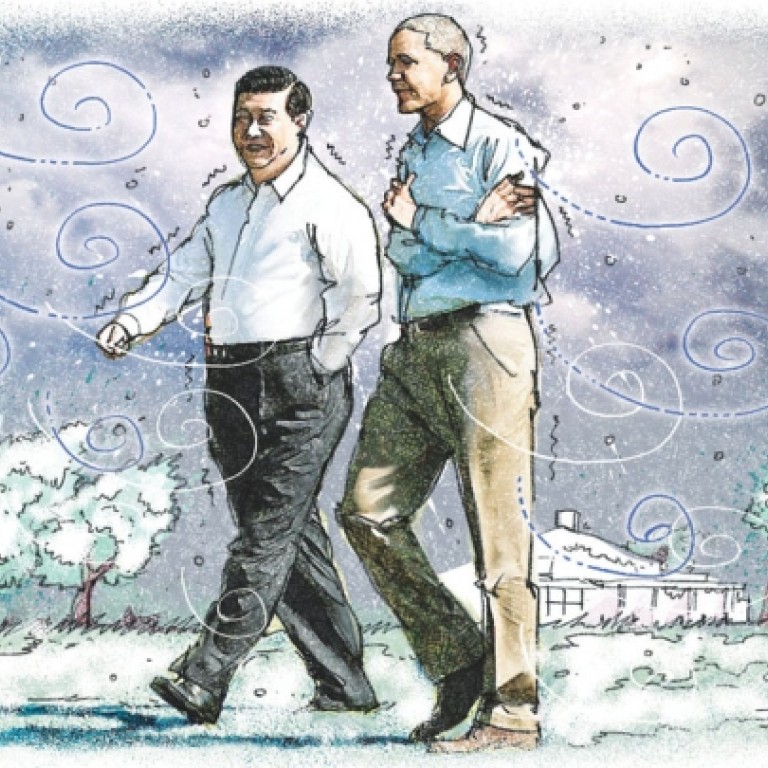
The cold war isn't over, just remade
Paul Letters says the cold war isn't over yet: its front lines may have shifted to the Western Pacific, but the world, dominated by two rival powers, remains tethered to 'a peace that is no peace'
The cold war is commonly referred to as a topic of history, yet it is not over - it has just regrouped, and now we face history in the remaking. Today is George Orwell's birthday, and he's looking good for 110. He originated the term "cold war" in a 1945 article in the London written shortly after Hiroshima and Nagasaki. Orwell feared a divided world where nations become unconquerable - due to nuclear weapons - and in a "permanent state of 'cold war'." He predicted "an end to large-scale wars at the cost of prolonging indefinitely a 'peace that is no peace'"; future history books will define the 21st century just so.
In true cold war fashion, the two old superpowers again face off today in a Geneva summit. The support of Russia and America for opposing sides in the Syrian conflict echoes the proxy wars of not so long ago. But while the eyes of the world are on Syria, the neo-cold war's epicentre simmers further east.
In March, Xi Jinping made Moscow his first diplomatic stop as China's president and declared the Sino-Russian bilateral relationship as the world's most important, particularly as a strategic balance to the global order. From Cuba to Iran to North Korea, Russia and China have continued to arm America's enemies decades after the cold war apparently ended. Although Russia and China have recently limited their support for both Tehran and Pyongyang, the 60-year arms race by the two Koreas and their allies has long entrenched the most heavily fortified border in the world.
The heat has now returned to where the cold war first ignited: East Asia. In the 1940s, the US backed - however half-heartedly - the losers in China's civil war, and, from Beijing's perspective, continued American support for Taiwan leaves the wound festering. But it was the Korean war that saw the cold war sear, pitching Western capitalism against Eastern communism - and American troops against Chinese - head to head. Again today, the Korean Peninsula displays cold war peaks of tension.
California's recent US-China presidential summit, hailed as the most important since Richard Nixon met Mao Zedong , produced a major area of concurrence - one that echoes the cold war: a nuclear North Korea would spur an arms race in South Korea and Japan, and even more US military power would pivot into the Western Pacific.
US Defence Secretary Chuck Hagel recently reaffirmed American escalation of military power in the Asia-Pacific region, which Beijing views as a reassertion of the policy of containment that began under president Harry Truman. The US, still bound by early cold war treaties, continues to arm and protect its cold war allies - and China's rivals - such as Taiwan, South Korea and Japan. And Japan now proposes military expansion while its dispute with China over the Senkaku/Diaoyu islands broils.
The cold war was not extinguished by eastern Europe's collapse. The front line now lies in the Western Pacific: it runs through the Sea of Japan, snips the Korean Peninsula in two and hugs China's coastline down through the East and South China seas, with Taiwan and the Philippines - two of several nations opposing China's claims to the oil- and gas-rich Spratly Islands - firmly on the US side of the line.
Is Orwell too white and too dead to be relevant to Asia today? His father was an opium dealer and, as a young man, Orwell himself partook in suppression as a policeman in colonised Burma. That was where he began to see the malevolence of a superpower. Twenty years later, Orwell packed a lot into that 1945 article. He predicted that "the haggling as to where the frontiers are to be drawn … will continue for some years, and [a] third of the three super-states - East Asia, dominated by China", will rise over time.
Although the Sunnylands summit lacked the tension of the cold war's darkest days, the air is far from clear between the world's greatest powers. In addition to territorial disputes, other Orwellian shadows loom. Satellite spying and cyberespionage are merely new tools for old habits - not to mention that the US has joined China in spying on its own citizens.
And you would think China's leaders might see "thought reform" as an Orwellian cliché, but its leaders still dish it out to political prisoners at "re-education through labour" camps, in a system that almost parodies Orwell's prophetic (and currently high-selling)
The BBC news website questioned whether the purpose of the Sunnylands summit was to avoid a third world war, for "it is certainly aimed at making sure both sides know the flashpoints". Fortunately, a third world war is implausible, and not just because of nuclear weapons. China's rise has crowbarred an "e" into "Mad" - mutually assured economic destruction, as former US ambassador to China Jon Huntsman and political scientist Ian Bremmer have observed
A cold war - a "peace that is no peace" - is what we've got. Escalating American military power in the Asia-Pacific isn't a solution, it's a reaction - as it would be if the US sent its military might into Syria. In each case, the same question remains: then what?

